Citrix 1Y0-402 Citrix XenApp and XenDesktop 7.15 Assessment, Design and Advanced Configurations Online Training
Citrix 1Y0-402 Online Training
The questions for 1Y0-402 were last updated at Apr 08,2025.
- Exam Code: 1Y0-402
- Exam Name: Citrix XenApp and XenDesktop 7.15 Assessment, Design and Advanced Configurations
- Certification Provider: Citrix
- Latest update: Apr 08,2025
Scenario: A Citrix Architect needs to design a new XenApp and XenDesktop environment. Currently, the environment is configured with two locations with identical XenDesktop Sites. Each Site has two Delivery Controllers, two StoreFront servers, and one NetScaler high availability pair. The same applications have been published from both Sites for all the users. Two Zones (Zone A and Zone B) are configured in each Site with one Controller in each zone. The Microsoft Exchange server is only accessible from Virtual Delivery Agent (VDA) machines in Zone A in each Site.
The following access requirements have been identified:
– Users should have a single URL when accessing resources from different Sites.
– Users should always connect to the datacenter closest to their location.
– Applications added to Favorites within Citrix Receiver should be retained when accessed from different Sites.
– Launched applications and desktops should always connect through a local NetScaler.
– No duplication of applications published from different Sites.
– Microsoft Outlook should always launch in Zone A.
The architect should recommend configuring Optimal Gateway routing on ___________across both locations to ensure that users connect through a local NetScaler. (Choose the correct option to complete the sentence.)
- A . Delivery Controllers
- B . StoreFront servers
- C . Global Server Load Balancing (GSLB) vServers
- D . NetScaler appliances
Scenario: A Citrix Architect needs to design a new XenApp and XenDesktop environment. While designing Universal Print server (UPS) for the customer, the architect is asked to ensure that the UPS design can handle 500 simultaneous print jobs per minute.
What must the architect deploy to support the load estimated by the customer?
- A . Two UPS servers and configure UPS for load balancing policy
- B . Ten UPS servers and configure UPS for load balancing policy
- C . Five UPS servers and configure NetScaler load balancing
- D . Two UPS servers and configure NetScaler load balancing
- E . Five UPS servers and configure UPS for load balancing policy
- F . Ten UPS servers and configure NetScaler load balancing
Scenario: A Citrix Architect is designing an environment for a large company.
The company has identified the following user groups and requirements.
– Product Managers – Typically, they work from inside the company network but are able to work from home. They need to use a variety of standard productivity and web-based SaaS applications.
– Field Sales Engineers – They frequently work with mobile devices and tend to access the environment externally. They need access to sales tools and the front-end of the customer database.
– Web Developers – Internal and remote workers who use specialized hardware with a graphics card to handle resource-intensive applications.
Which FlexCast model should the architect assign to Web Developers?
- A . VM Hosted Applications
- B . Published Apps
- C . Published Desktops
- D . Hosted VDI
Scenario: A Citrix Architect needs to design a new XenApp and XenDesktop environment.
The architect has identified printing requirements for certain user groups and locations, as shown in the Exhibit.
Click the Exhibit button to view the requirements.
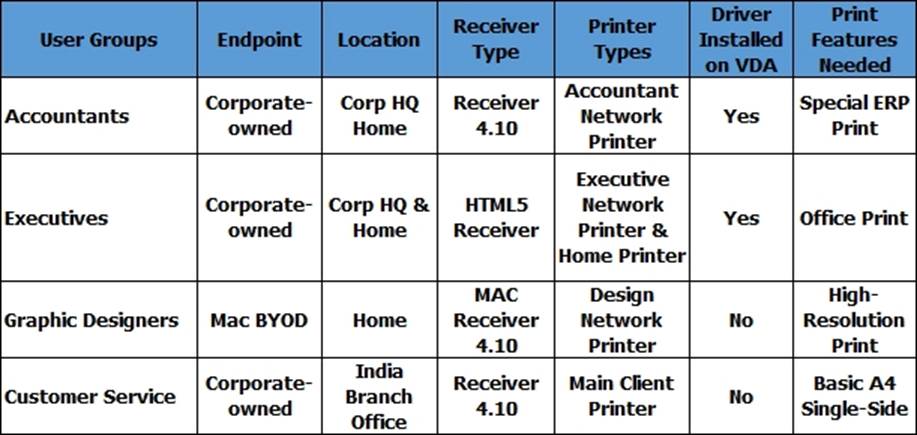
Currently, no printer settings or policies have been configured, and as such, the environment is using default settings. Universal Print Server will NOT be used in this design.
Which two settings should the architect configure to allow the Executives group to achieve the desired print behavior and to ensure their print jobs are optimally routed? (Choose two.)
- A . Set Auto-create Client Printers policy to auto-create local printers only
- B . Enable Auto-create PDF Universal Printer policy
- C . Set Direct connections to print servers policy to Enabled
- D . Set Direct connections to print servers policy to Disabled
- E . Configure Session Printers policy
- F . Configure Default Printers policy
- G . Set Auto-create Client Printers policy to auto-create all client printers
Scenario: A Citrix Architect needs to design a new XenApp and XenDesktop environment.
The following design requirements have been identified:
– External Partner users should be denied access to published resources unless connecting from a corporate laptop running up-to-date antivirus software.
– External users and partners authenticate using Two-Factor authentication.
– External employees are logged off Citrix Receiver for Web after 10 minutes of inactivity.
– Clipboard mapping is enabled for external engineering users.
– Once authenticated to a company device, internal users do NOT authenticate a second time to access published apps and desktops.
Later in the Assess phase, the architect creates the Access Matrix shown in the Exhibit.
Click the Exhibit button to view the Access Matrix.
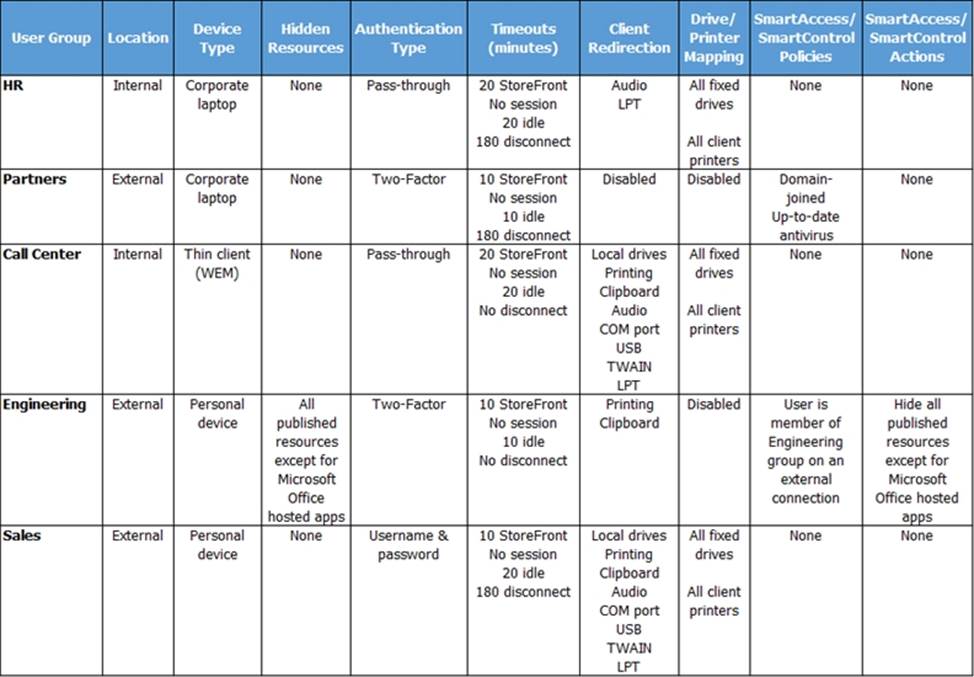
During the quality assurance review, the architect determines that one of the user groups does NOT align with the design requirements.
Which user group should the architect modify to match the design requirements identified?
- A . HR
- B . Engineering
- C . Call Center
- D . Partners
- E . Sales
Scenario: A Citrix Architect needs to design a new XenApp and XenDesktop environment.
The architect has determined the user groups and FlexCast model listed in the Exhibit during the high-level design.
Click the Exhibit button to view the user group and FlexCast model details.

Which graphics protocol should the architect select for the highlighted group in the Exhibit?
- A . Thinwire (Legacy)
- B . Framehawk
- C . Thinwire+
- D . H.264
Scenario: A Citrix Architect needs to design a new XenApp and XenDesktop environment. The architect has identified the requirements, based on the assessment and early stages of the design.
Click the Exhibit button to view the requirements.
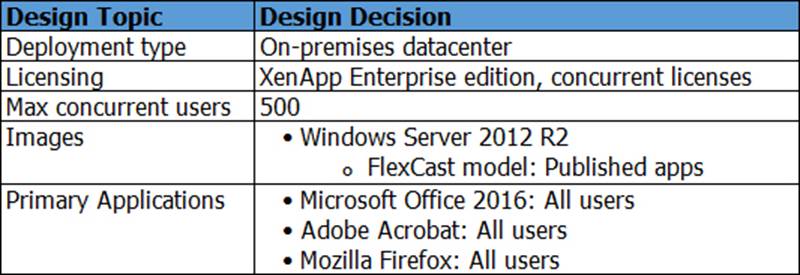
Additionally, the IT team has identified the following general requirements:
– The provisioning strategy should be compatible with the planned design decisions.
– The provisioning strategy should minimize the steps required to perform image and application updates.
Which three follow-up questions should the architect ask about this environment, based on the planned design decisions? (Choose three.)
- A . How much storage is available for the Virtual Delivery Agent (VDA) machines?
- B . What is the VM uplink speed in the current deployment?
- C . Is PXE currently being used in the subnets where the Virtual Delivery Agent (VDA) machines will be placed?
- D . Will the machines using the images be physical or virtual?
- E . Are there any applications which must only be accessed by a subset of users?
A Citrix Architect needs to conduct a capabilities assessment for an organization that wants to design and build a new XenApp and XenDesktop environment.
Which four capabilities will directly influence whether the existing Citrix administrative team will have the capacity to support the new environment? (Choose four.)
- A . Network architecture
- B . Current backup solutions
- C . Users and applications
- D . Existing XenApp and XenDesktop environments
- E . Training and certifications of support staff and users
- F . Current storage solutions
- G . Image management processes
Scenario: A Citrix Architect must complete a XenApp and XenDesktop security assessment. After examining the network topology for the hypervisor hosts supporting the Virtual Delivery Agent (VDA) machines, the architect finds that some of the network connections are NOT following leading security practices.
Click the Exhibit button to view a high-level diagram which shows the connectivity between various components.
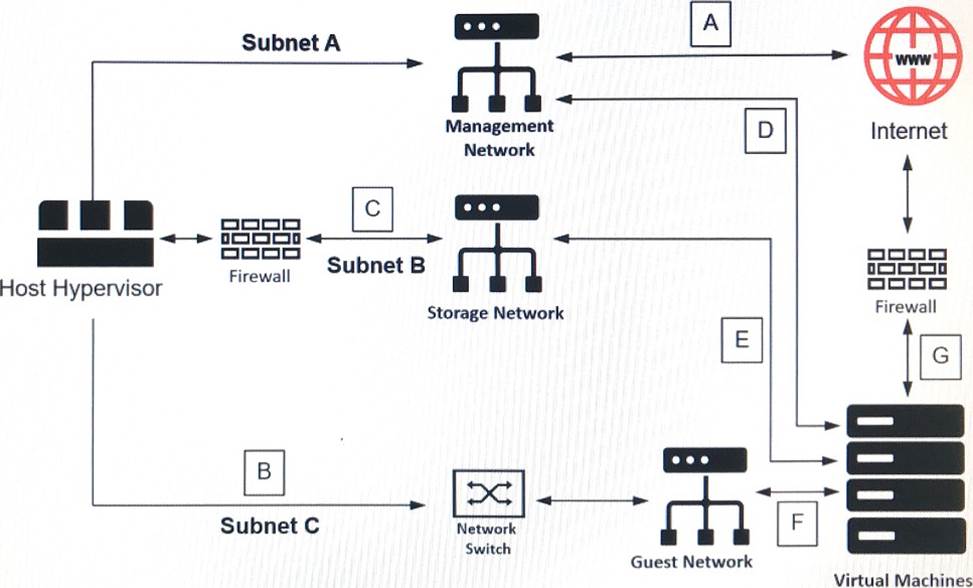
Which three of the labeled areas of the diagram represent connections which are NOT following Citrix leading security practices? (Choose three.)
- A . G
- B . B
- C . A
- D . E
- E . F
- F . D
- G . C
Scenario: A Citrix Architect needs to redesign an existing XenApp and XenDesktop environment to use Machine Creation Services (MCS). During the design discussions, the locations for the MCS-provisioned thin clone machine disks are proposed as shown in the Exhibit.
Click the Exhibit button to view the details.
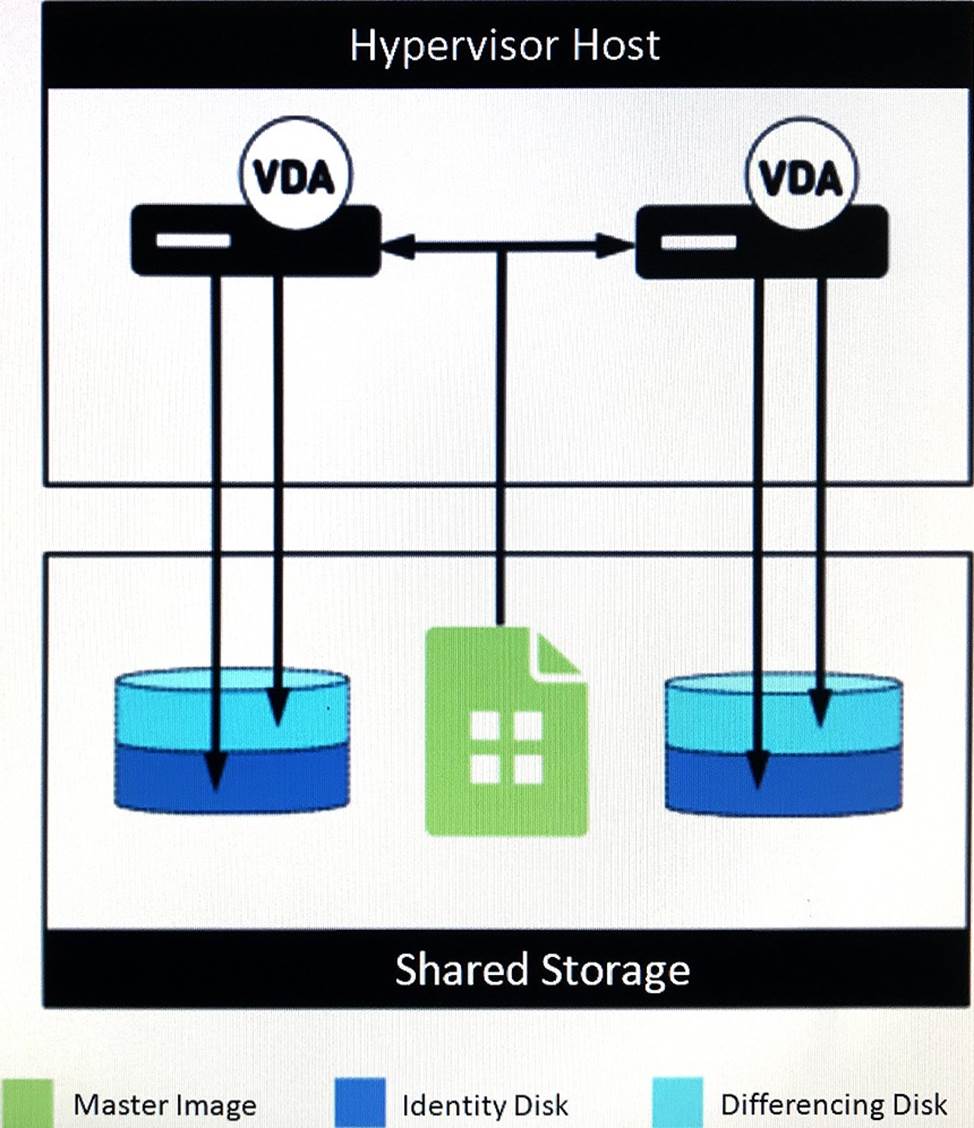
Which potential concern should the architect address with the customer before proceeding with this configuration? (Choose two.)
- A . It is limited to NFS shared storage.
- B . It will require substantial read IOPS from the shared storage location during machine creation and updates.
- C . It will require substantial write IOPS to the shared storage location as temporary data is written.
- D . It will require more storage to be allocated on the VM hosts compared with other options.
- E . It is limited to certain hypervisors.
Latest 1Y0-402 Dumps Valid Version with 128 Q&As
Latest And Valid Q&A | Instant Download | Once Fail, Full Refund

